US reports on 'Chinese killer' slammed
(China Daily/Agencies)Updated: 2007-04-19 07:03
On Dec. 13, 2005, a magistrate ordered Cho to undergo an evaluation at Carilion St. Albans, a private psychiatric hospital. The magistrate signed the order after an initial evaluation found probable cause that Cho was a danger to himself or others as a result of mental illness.
The next day, according to court records, doctors at Carilion conducted further examination and a special justice, Paul M. Barnett, approved outpatient treatment.
A medical examination conducted Dec. 14 found that that Cho's "affect is flat. ... He denies suicidal ideations. He does not acknowledge symptoms of a thought disorder. His insight and judgment are normal."
The court papers indicate that Barnett checked a box that said Cho "presents an imminent danger to himself as a result of mental illness." Barnett did not check the box that would indicate a danger to others.
It is unclear how long Cho stayed at Carilion, though court papers indicate he was free to leave as of Dec. 14. Virginia Tech spokesman Larry Hincker said Cho had been continually enrolled at Tech and never took a leave of absence.
A spokesman for Carilion St. Albans would not comment.
Though the stalking incidents did not result in criminal charges, police referred Cho to the university's disciplinary system, Flinchum said. But Ed Spencer, assistant vice president of student affairs, would not comment on any disciplinary proceedings, saying federal law protects students' medical privacy even after death.
Some parents complained that the university failed to lock down the campus and spread a warning after the first round of shootings. Still, two days after the shooting spree, many students resisted pointing fingers.
"Who would've woken up in the morning and said, `Maybe this student who's just troubled is really going to do something this horrific?'" said Elizabeth Hart, a communications major and a spokeswoman for the student government.
Lucinda Roy, professor of English at Virginia Tech, said that she, too, relayed her concerns to campus police and various other college units after Cho displayed antisocial behavior in her class and handed in disturbing writing assignments.
But she said authorities "hit a wall" in terms of what they could do "with a student on campus unless he'd made a very overt threat to himself or others." Cho resisted her repeated suggestion that he undergo counseling, Roy said.
One of the first Virginia Tech officials to recognize Cho's problems was award-winning poet Nikki Giovanni, who kicked him out of her introduction to creative writing class in late 2005.
Students in Giovanni's class had told their professor that Cho was taking photographs of their legs and knees under the desks with his cell phone. Female students refused to come to class. She said she considered him "mean" and "a bully."
Questions lingered over whether campus police should have issued an immediate campus-wide warning of a killer on the loose and locked down the campus after the first burst of gunfire.
Police said that after the first shooting, in which two students were killed, they believed that it was a domestic dispute, and that the gunman had fled the campus. Police went looking for a young man, Karl David Thornhill, who had once shot guns at a firing range with the roommate of one of the victims. But police said Thornhill is no longer under suspicion.
 | 1 | 2 | 3 |
| ||
|
||
|
||
|
|




